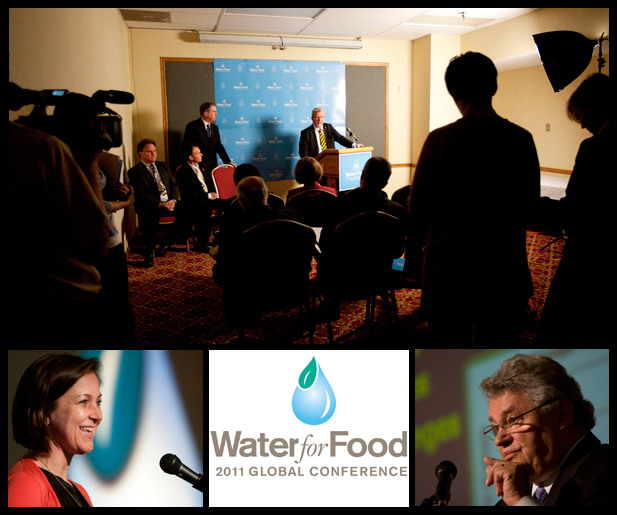
The looming global water crisis is as much a crisis of how the resource is governed as it is of supply and usage, a UNESCO-IHE representative reported May 3 during the 2011 global Water for Food Conference.
Andras Szollosi-Nagy’s presentation was one of several Tuesday that followed a “yes, but...” theme: Yes, the world has the technological and intellectual capacity to manage water to feed a world whose food needs are expected to double in the next few decades ...but the challenges to doing so are immense.
The conference, hosted by the Robert B. Daugherty Water for Food Institute of the University of Nebraska and the Bill & Melinda Gates Foundation, drew more than 400 producers, scientists, industry representatives and policymakers from more than 20 countries.
Szollosi-Nagy, rector of the UNESCO-IHE Institute for Water Education in Delft, Netherlands, noted that the world’s population increased threefold in the 20th century, while water use expanded sixfold. That is not sustainable in the 21st century.
One challenge, he said, is to put water, often taken for granted, “in the minds of people ...whether politicians or the general public.”
“We have failed to convey this message to political leaders,” Szollosi-Nagy added. “The crisis is clearly a crisis in how water is being governed.”
The UNESCO-IHE official said that while policymakers must base their food policy decisions on good science, scientists must give them the information they need to make those decisions.
Julia Bucknall, sector manager of the World Bank’s Water Department, said these policymakers must make extraordinarily difficult decisions. “We have to take water away from some people who have it now and give it to others who don’t,” she said.
While Bucknall agreed with other conference speakers that expanding irrigation in the developing world is essential to producing food more efficiently, evidence so far indicates that irrigated land in these areas underperforms economically. Future irrigation-investment decisions will have to be more nuanced to take into account local cultures and conditions and will have to move beyond the basic, but still difficult, task of getting water from dams to fields.
“Our irrigation investments have to get more complicated, but if we make them more complicated, we can make them more successful and equitable,” Bucknall added.
Another international water expert warned of the “hidden water footprint of our daily diet.”
On average, humans use 50 liters of water per day for personal needs and 3,500 liters a day for their food, said Anders Berntell, executive director of the Stockholm International Water Institute.
Berntell said greater efforts must be made to reduce the loss of food “from field to fork.” Berntell estimated that about 4,600 calories per day per person are produced in the world’s food system, but by the time that food makes it to consumer, only 2,000 calories remain. Losses occur in post-harvest handling, feed for animals and in distribution.
“What other product could we afford to lose 50 percent of from producer to consumer?” he asked.
In addition to improving water productivity and efficiency, and reducing field-to-fork losses, international policy must focus on improved trade and an understanding that grain-fed meat and biofuel production are not efficient uses of crops, said Berntell. He acknowledged that those last two points are not popular ones in places like Nebraska.
One agricultural producer suggested that farmers must make decisions about water in a more calculating way.
Louis Sartor, who grows citrus in Australia, said Monday afternoon that an active water-trading market has developed in his country in the last 20 years. Farmers may realize it makes better economic sense some years to sell their water than to grow a crop.
“We’ve tried to remove the emotion in water and treat water as a commodity which is market driven,” Sartor said.
What’s needed, a UNL agronomy professor told reporters in a briefing, is nothing less than a second “green revolution” that will double agricultural production while reducing water use and protecting the environment.
“That’s never been done in human history,” said Ken Cassman, who recently was named the first chair of the Independent Science and Partnership Council of the Consultative Group on International Agricultural Research.
“We’re in the center of the universe for this second green revolution,” Cassman said of Nebraska. “We can lead it.”
The conference concludes today.
- Dan Moser, IANR News
More details at: http://go.unl.edu/wff2011